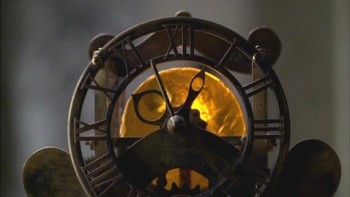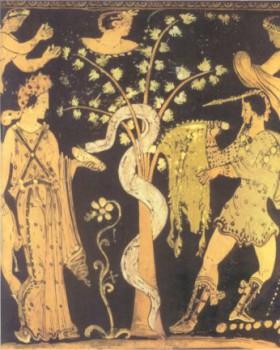Ancient Worlds: Jason and the Original MacGuffin

Question: What do the Maltese Falcon, a suitcase full of money, a crystal skull, and a cow shaped silver creamer all have in common?
Answer: They’re MacGuffins.
MacGuffins are ubiquitous to storytelling, especially in genre fiction. They’re That Thing that Our Guys need to get before Their Guys do. The Rambaldi device / relic of George Washington / critical data file… it doesn’t matter what it is, it’s entire purpose is to give the story, well, purpose. We don’t care why the jewel thief is after this particular necklace, we just care that he is. The chase itself is the story.
While the term was popularized by Alfred Hitchcock (and may have been coined by one of his writers), the MacGuffin is an ancient plot device. And its earliest example in Western Literature is, to my knowledge, the Golden Fleece.
In fact, it’s hard to come up with a more pointless quest item than the Golden Fleece. It doesn’t do anything. It has no magical properties, comes with no divine benefit, and grants nothing to its possessor other than the pleasure of having a golden fleece. One would have to assume that it’s valuable, being golden, but really, there are a lot of ways to get a few pounds of gold.

In short, it’s the quintessential MacGuffin. But it forms the central plot motivation for the enduringly popular story of Jason and the Argonauts. The story goes that in ancient Iolcus, the rightful king, Aeson, was overthrown by his wicked brother Pelias. Aeson had an infant son, whose mother spirited him out of the city to safety. That boy, Jason, grew to manhood and returned home. Pelias, not wanting to murder the boy outright but needing to get rid of him quickly, gave him an impossible quest: bring back the Golden Fleece, which was kept in Colchis on the shores of the Black Sea.
There are many theories on what the fleece might represent. Some people think it’s a mythologized memory of the practice of using fleeces to wash gold out of rivers: think of it as the filter in primitive gold panning. Other people think it may have been the practice of inscribing manuscripts in gold ink, or a symbol of royal power, or that the fleece represented the wealth of the distant East. These things are fascinating to think about , but all the theorizing ultimately misses the fact that the Golden Fleece is a MacGuffin. Pelias could have sent Jason after the Holy Hand Grenade of Antioch and the story wouldn’t have gone any differently.
Which, given how the story goes, is a damned shame.
Next up: Argonauts Assemble!
Great article, Elizabeth! After reading an autobiography of Hitchcock, I started looking at some of the stories I was writing and how the MacGuffin fits in. I mention Hitch in the Afterword in my “Mad Shadows,” how he put it all together for me, and in one or two of the articles I’ve written for Black Gate. Glad to know someone else sees the value of the MacGuffin.
Thank you, Joe!
I should add as a morning-after note that even though the MacGuffin doesn’t matter in a structural sense, it has to matter to the characters and it has to matter to the audience, or the story fails. (I think Stephen Spielberg said this was the big mistake the most recent Indiana Jones movie made, and… well, it was certainly one of them.) You can play with the MacGuffin, lampshade it, or subvert it, but you can’t flub it. Probably my favorite example of “playing with the MacGuffin” is in Pulp Fiction: the MacGuffin is never clearly seen, so *we* never invest in it. But the characters do, and Tarantino makes it work.